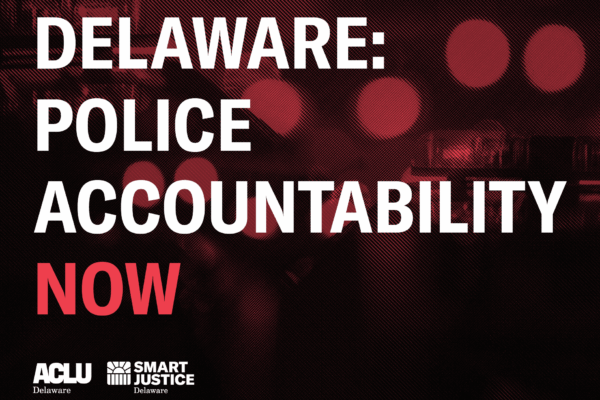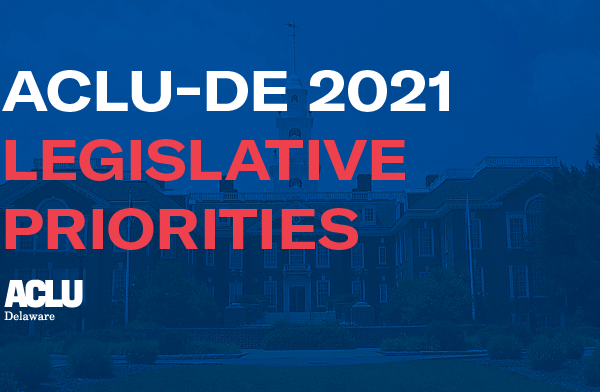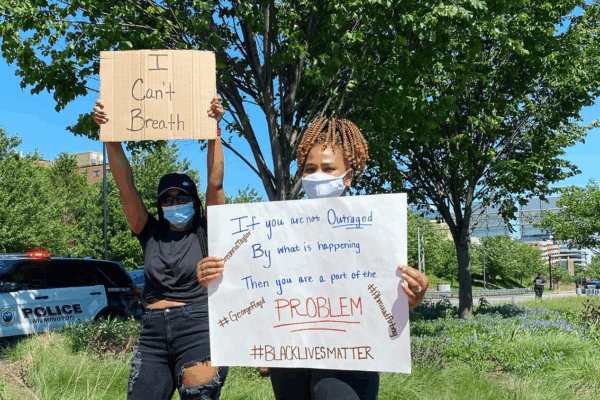Police misconduct and abuse of power is a systemic failure. Here are our demands for police accountability and transparency, as well as some common myths about the Law Enforcement Officers' Bill of Rights (LEOBOR) and the facts behind them.
Demand #1: The Law Enforcement Officer Bill of Rights (LEOBOR) and the Delaware Freedom of Information Act (FOIA) must be amended so that investigations into police misconduct cases will be transparent and made public.
A basic and crucial function of any police department is to identify, punish and deter police misconduct. In many communities, there is significant distrust that departments are transparent or accountable for misconduct. Survivors of police abuse deserve to know whether their police misconduct cases were fully investigated or not.
In order to restore community trust in the ability of departments to effectively manage their officers, departments need to show how they conduct such investigations. They need to be accountable for their work, which can only happen if transparency is restored. In a democracy, trust must be earned, not simply demanded. Police misconduct and killings can’t be reined in until the public are given full insight into investigations and incidents.
MYTH #1: An officer’s job is difficult and stressful. They deserve special rights. If we make changes to LEOBOR, police officers will have fewer rights.
FACT #1:
Police officers are the only public employees who are armed and authorized by the virtue of their job to arrest, use force, and kill. The primary purpose of LEOBOR is to offer protections for police when they’re faced with disciplinary review because of allegations they abused their incredible power. These are extra protections that block transparency and accountability, and they’re protections that no other public employee has. These special rights prevent police from being disciplined promptly and fairly when they commit wrongdoing. Accountability is necessary for public safety. And we should not allow officers to stay on the force who have a record of abusing and killing Black and Brown people. This is unacceptable.
MYTH #2: If details about a police misconduct case are revealed, the information may be misconstrued.
FACT #2:
The information is already misconstrued when it is hidden from or selectively leaked to the public. When the police hide information from survivors of police abuse and the broader community, it only further increases the public’s distrust of the police and their account of what happened.
If the police operate in the spirit of transparency first, where the expectation is openness at the outset of an incident of police abuse, it allows for trust to slowly begin to build. Telling people that they can’t be trusted with information about investigations of misconduct allegations is the surest way to create mistrust and lack of faith in those investigations.
MYTH #3: We should just trust that the police investigated the misconduct case properly.
FACT #3:
No one should be expected to blindly trust police departments to police themselves. This is especially true given law enforcement’s long history of racism, corruption, and police brutality against Black and Brown people. Police saying 'trust us' is not good enough. If a case was properly investigated, why wouldn’t a police department want the public to know and see that the case was handled properly and investigated thoroughly?
MYTH #4: If the Delaware Freedom of Information Act (FOIA) is changed, officers’ personal information (their address, children’s school information, etc.) will be made public.
FACT #4:
FOIA should be amended so that these records may be disclosed and can be redacted to shield particular information that should not be made public.
It is unlikely that irrelevant personal information about an officer is in an internal affairs record. But if it is, it could and should be redacted. Similar to how information could and would be redacted from any other police record that was disclosed to the public. What should be made public is how police misconduct cases were investigated – or if they were even investigated at all, and the names and ranks of those officers who were involved. These types of records are not shielded from disclosure to the public in many other states, and no problems have resulted from that practice.
MYTH #5: Making changes to LEOBOR that make police records public will make retaining and recruiting police officers more difficult.
FACT #5:
There is no evidence to support this myth. Current Delaware police officers and applicants with genuine interest in protecting and serving the community should not be deterred from their profession on the sole basis that their misconduct records remain private. Making records public should not be an issue for anyone who has nothing to hide. In fact, public records can show when police officers have acted appropriately, helping to amplify an officers’ good standing when they have not been a part of any misconduct.
Demand #2: The Law Enforcement Officer Bill of Rights (LEOBOR) must be amended to allow community-led oversight of local police departments.
The special rights in LEOBOR ensure that only police officers can investigate alleged police misconduct. Amendments to LEOBOR should allow local jurisdictions to create external community oversight boards that allow Delawareans other than police officers to conduct investigations into alleged misconduct and provide input into police department policies and disciplinary process.
MYTH #6: Community members do not need control over their police department.
FACT #6:
The ability of residents to control their own police department is a basic right in a democracy. Community members should determine the policies that will guide the officers who police their city.
MYTH #7: Community members without police training and experience cannot properly investigate and judge police actions.
FACT #7:
An external perspective on policing can be crucial in identifying and stopping officer misconduct. Many oversight boards provide training about police work to board members and some are designed to have one non-voting law-enforcement professional to answer questions or provide explanations as needed.
MYTH #8: Officers who engage in misconduct are isolated “bad apples.”
FACT #8:
Police misconduct and abuse of power is a systemic failure. Organizational and cultural factors of police departments, such as values, environment, and disciplinary mechanisms, contribute to the persistence of misconduct. When officers are not held accountable for misconduct, it allows a culture of misconduct to thrive. Community oversight boards will provide an external check to ensure that officers are held accountable for misconduct and deterred from future misconduct.




